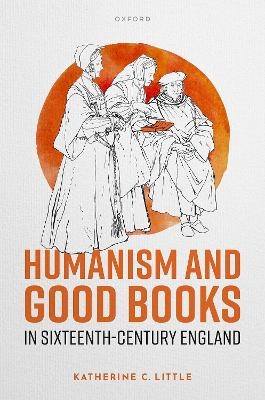
Humanism and Good Books in Sixteenth-Century England
Oxford University Press (Verlag)
978-0-19-288319-3 (ISBN)
This book explores sixteenth-century humanism as an origin for the idea of literature as good, even great, books. It argues that humanists located the value of books not only in the goodness of their writing-their eloquence--but also in their capacity to shape readers in good and bad behavior, thoughts, and feelings, in other words, in their morality. To approach humanism in this way, by attending to its moral interests, is to provide a new perspective on periodization, the transition from the Middle Ages to the Renaissance / early modern. That is, humanists did not so much rupture with medieval ideas about literature or with medieval models as they adapted and altered them, offering a new confidence about an old idea: the moral instructiveness of pagan, classical texts for Christian readers.
This revaluation of literature was a double-edged sword. On the one hand, humanist confidence inspired authors to invent their own good books--good in style and morals--in morality plays such as Everyman and the Christian Terence tradition and in educational treatises such as Sir Thomas Elyot's Boke of the Governour. On the other hand, humanism placed a new burden on authors, requiring their work to teach and delight. In the wake of humanism, authors struggled to articulate the value of their work for readers, returning to a pre-humanist path that they associated with Geoffrey Chaucer. This medieval-inflected doubt pervades the late sixteenth-century writings of the most prolific and influential Elizabethans-Robert Greene, George Gascoigne, and Edmund Spenser.
Katherine C. Little received her BA from UC-Berkeley and her PhD from Duke University. She has taught at Vassar College, Fordham University, and the University of Colorado Boulder. Winner of a fellowship from the National Endowment for the Humanities and co-founder of the online journal, New Chaucer Studies: Pedagogy & Profession, she has published essays on topics both medieval and early modern. Her first book explores the late medieval heresy, Lollardy, Confession and Resistance: Defining the Self in Late Medieval England; and the second charts the re-emergence of pastoral, Transforming Work: Early Modern Pastoral and Late Medieval Poetry.
Introduction: Reading Is Good for You
1: The New, the Medieval, and the Renaissance
2: Humanism and the Morality Play
3: Humanist Moral Fusion: Terence and the Prodigal Son
4: The Uses of Good Literature
5: Good Literature [bonae litterae] and the Good
6: Horatian Dulce et Utile as Poisonous Reading
7: Worldly Vanity and George Gascoigne
8: Edmund Spenser's Contemptus Mundi
Afterword: Confidence and Doubt
| Erscheinungsdatum | 17.05.2023 |
|---|---|
| Verlagsort | Oxford |
| Sprache | englisch |
| Maße | 161 x 240 mm |
| Gewicht | 514 g |
| Themenwelt | Geisteswissenschaften ► Sprach- / Literaturwissenschaft ► Anglistik / Amerikanistik |
| Geisteswissenschaften ► Sprach- / Literaturwissenschaft ► Literaturwissenschaft | |
| ISBN-10 | 0-19-288319-4 / 0192883194 |
| ISBN-13 | 978-0-19-288319-3 / 9780192883193 |
| Zustand | Neuware |
| Informationen gemäß Produktsicherheitsverordnung (GPSR) | |
| Haben Sie eine Frage zum Produkt? |
aus dem Bereich


